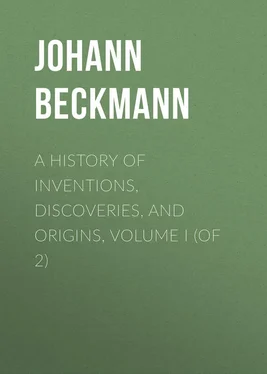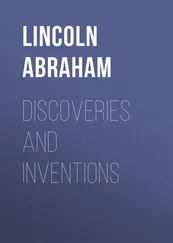Johann Beckmann - A History of Inventions, Discoveries, and Origins, Volume I (of 2)
Здесь есть возможность читать онлайн «Johann Beckmann - A History of Inventions, Discoveries, and Origins, Volume I (of 2)» — ознакомительный отрывок электронной книги совершенно бесплатно, а после прочтения отрывка купить полную версию. В некоторых случаях можно слушать аудио, скачать через торрент в формате fb2 и присутствует краткое содержание. Жанр: foreign_antique, foreign_prose, на английском языке. Описание произведения, (предисловие) а так же отзывы посетителей доступны на портале библиотеки ЛибКат.
- Название:A History of Inventions, Discoveries, and Origins, Volume I (of 2)
- Автор:
- Жанр:
- Год:неизвестен
- ISBN:нет данных
- Рейтинг книги:4 / 5. Голосов: 1
-
Избранное:Добавить в избранное
- Отзывы:
-
Ваша оценка:
- 80
- 1
- 2
- 3
- 4
- 5
A History of Inventions, Discoveries, and Origins, Volume I (of 2): краткое содержание, описание и аннотация
Предлагаем к чтению аннотацию, описание, краткое содержание или предисловие (зависит от того, что написал сам автор книги «A History of Inventions, Discoveries, and Origins, Volume I (of 2)»). Если вы не нашли необходимую информацию о книге — напишите в комментариях, мы постараемся отыскать её.
A History of Inventions, Discoveries, and Origins, Volume I (of 2) — читать онлайн ознакомительный отрывок
Ниже представлен текст книги, разбитый по страницам. Система сохранения места последней прочитанной страницы, позволяет с удобством читать онлайн бесплатно книгу «A History of Inventions, Discoveries, and Origins, Volume I (of 2)», без необходимости каждый раз заново искать на чём Вы остановились. Поставьте закладку, и сможете в любой момент перейти на страницу, на которой закончили чтение.
Интервал:
Закладка:
A History of Inventions, Discoveries, and Origins, Volume I (of 2)
ADVERTISEMENT
In revising Beckmann’s celebrated Work, we have endeavoured to improve it principally by altering such names, characters, descriptions, and opinions as have become obsolete, or are now known to be erroneous; and by such additions as seemed necessary to bring the accounts of the subjects treated of to the present state of knowledge. In some cases, these additions may appear to diverge from the declared object of the work; but in this we have only followed the example of Beckmann himself, who frequently deviates from a strict historical path, and we think advantageously, for the purpose of introducing curious, instructive, or amusing information. In most cases, where the subject under consideration is a process of manufacture, we have given a brief outline of its practice or theory, unless this had previously been done by the author. The translation, also, has been carefully compared with the German, but in only a very few cases could we detect errors which rendered the passages contradictory or unintelligible: on the whole, it is extremely well executed; and too much praise cannot be given to Johnston, for the judicious manner in which he has embodied in one article, detached essays on the same subject, which Beckmann published at different periods, as he acquired fresh information. The only instances in which this had been omitted, are the articles on Turf Конец ознакомительного фрагмента. Текст предоставлен ООО «ЛитРес». Прочитайте эту книгу целиком, купив полную легальную версию на ЛитРес. Безопасно оплатить книгу можно банковской картой Visa, MasterCard, Maestro, со счета мобильного телефона, с платежного терминала, в салоне МТС или Связной, через PayPal, WebMoney, Яндекс.Деньги, QIWI Кошелек, бонусными картами или другим удобным Вам способом.
, Cork Конец ознакомительного фрагмента. Текст предоставлен ООО «ЛитРес». Прочитайте эту книгу целиком, купив полную легальную версию на ЛитРес. Безопасно оплатить книгу можно банковской картой Visa, MasterCard, Maestro, со счета мобильного телефона, с платежного терминала, в салоне МТС или Связной, через PayPal, WebMoney, Яндекс.Деньги, QIWI Кошелек, бонусными картами или другим удобным Вам способом.
, and Quarantine Конец ознакомительного фрагмента. Текст предоставлен ООО «ЛитРес». Прочитайте эту книгу целиком, купив полную легальную версию на ЛитРес. Безопасно оплатить книгу можно банковской картой Visa, MasterCard, Maestro, со счета мобильного телефона, с платежного терминала, в салоне МТС или Связной, через PayPal, WebMoney, Яндекс.Деньги, QIWI Кошелек, бонусными картами или другим удобным Вам способом.
, which were still encumbered with addenda; in the present edition, these have been incorporated. All such quotations from Latin and Greek authors, as might be deemed essential to the understanding of the text, have been given in English; those of a mere critical and philological character, it has been thought advisable to leave untranslated. The book may be classed as a compound of learned research and light reading, suitable both to the popular reader and the scholar; and that character has been preserved in the present edition. To the kindness of John Frodsham, Esq., the present proprietor of Arnold’s Chronometer Establishment, we are indebted for much of the interesting information added to the article on ‘ Clocks and Watches Конец ознакомительного фрагмента. Текст предоставлен ООО «ЛитРес». Прочитайте эту книгу целиком, купив полную легальную версию на ЛитРес. Безопасно оплатить книгу можно банковской картой Visa, MasterCard, Maestro, со счета мобильного телефона, с платежного терминала, в салоне МТС или Связной, через PayPal, WebMoney, Яндекс.Деньги, QIWI Кошелек, бонусными картами или другим удобным Вам способом.
;’ and we have also to return our thanks to the publisher, Mr. H. G. Bohn, for the assistance he has constantly afforded us, as well as for his Memoir of the author.
TRANSLATOR’S PREFACE
That the arts had their rise in the East, and that they were conveyed thence to the Greeks, and from them to the Romans, is universally admitted. Respecting the inventions and discoveries however of the earliest ages, nothing certain is known. Many of those most useful in common life must have been the production of periods when men were little acquainted with letters, or any sure mode of transmitting an account of their improvements to succeeding generations. The taste which then prevailed of giving to every thing a divine origin, rendered traditional accounts fabulous; and the exaggeration of poets tended more and more to make such authorities less worthy of credit. A variety of works also, which might have supplied us with information on this subject, have been lost; and the relations of some of those preserved are so corrupted and obscure, that the best commentators have not been able to illustrate them. This in particular is the case with many passages in Pliny, an author who appears to have collected with the utmost diligence whatever he thought useful or curious, and whose desire of communicating knowledge seems to have been equal to his thirst for acquiring it.
Of all those nations whose history has been preserved, the most distinguished are certainly the Greeks and the Romans; but, as far as can be judged at this remote period, the former were superior to the latter in point of invention. The Romans indeed seem to have known little, except what they borrowed from the Grecians; and it is evident, by their sending their young men of rank to finish their education in Greece, that they considered that country as the seat of the arts and the sciences, and as a school where genius would be excited by the finest models, while the taste was corrected and formed. From some hints given however by Pliny and other writers, we have reason to conclude that the Romans possessed more knowledge of the arts than the moderns perhaps are willing to allow, and that some inventions, considered as new, may be only old ones revived and again rendered useful.
When Rome, abandoned to luxury and vice, became an easy prey to those hordes of barbarians who overran the empire, her arts shared in the general wreck, and were either entirely lost, or for a time forgotten. The deplorable state of ignorance in which Europe was afterwards plunged during several centuries, retarded their revival; and it was not till a late period, when favoured and protected by a few men of superior genius, that they began to be again cultivated. It cannot however be denied, that several important discoveries, altogether unknown to the ancients, which must have had considerable influence on the general state of society, were made in ages that can hardly be exempted from the appellation of barbarous. As a proof of this may be mentioned the invention of paper 1, painting in oil 2, the mariner’s compass 3, gunpowder 4, printing 5, and engraving on copper 6. After the invention of the compass and printing, two grand sources were opened for the improvement of science. In proportion as navigation was extended, new objects were discovered to awaken the curiosity and excite the attention of the learned; and the ready means of diffusing knowledge, afforded by the press, enabled the ingenious to make them publicly known. Ignorance and superstition, the formidable enemies of philosophy in every age, began soon to lose some of that power which they had usurped; and states, forgetting their former blind policy, adopted improvements which their prejudice had before condemned.
Читать дальшеИнтервал:
Закладка:
Похожие книги на «A History of Inventions, Discoveries, and Origins, Volume I (of 2)»
Представляем Вашему вниманию похожие книги на «A History of Inventions, Discoveries, and Origins, Volume I (of 2)» списком для выбора. Мы отобрали схожую по названию и смыслу литературу в надежде предоставить читателям больше вариантов отыскать новые, интересные, ещё непрочитанные произведения.
Обсуждение, отзывы о книге «A History of Inventions, Discoveries, and Origins, Volume I (of 2)» и просто собственные мнения читателей. Оставьте ваши комментарии, напишите, что Вы думаете о произведении, его смысле или главных героях. Укажите что конкретно понравилось, а что нет, и почему Вы так считаете.












